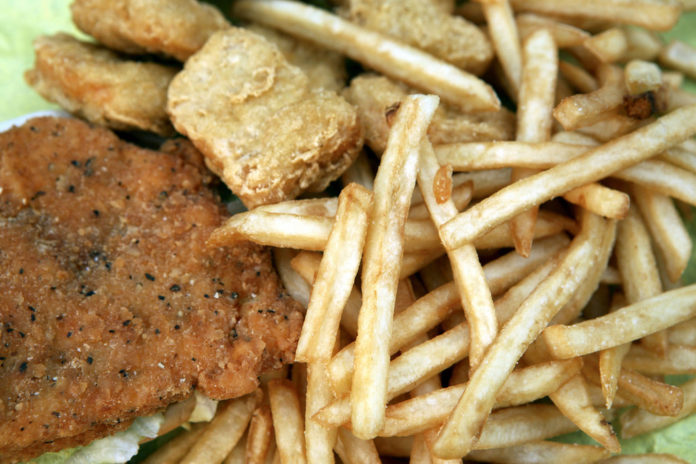
An effort to ban trans fats in Rhode Island restaurants has lost much of its momentum, with a compromise approved by the R.I. House of Representatives last week that would require only an educational campaign and incentives, and has left advocates in the Senate unsure what to do next.
Heart disease is the No. 1 cause of death in Rhode Island, and across the nation there’s a growing awareness of the substantial role artificial trans fats play in heart disease. New York City and Philadelphia have both banned the use of trans fats in food establishments.
Measures to that effect were introduced at the General Assembly earlier this year, but the Rhode Island Hospitality & Tourism Association strongly opposed them, saying they would create hardships for an industry that is already voluntarily eliminating trans fats.
The association took its message to the bills’ sponsors and to the R.I. Department of Health, urging them to focus their efforts on raising awareness of the dangers of trans fats. It worked.
“After I had submitted the bill to ban trans fats, we noticed that many restaurateurs voluntarily were publishing the fact they were eliminating trans fats in their businesses,” said Rep. Joseph M. McNamara, D-Warwick. “That, combined with the fact that the Rhode Island hospitality industry was offering their collaboration with the DOH to work out a voluntary incentive-based certification program, I think, was an excellent compromise.”
The amended bill, approved in the House by a 55-to-5 vote last Tuesday, asks the Department of Health to work to inform restaurant owners of the dangers of and alternatives to artificial trans fats and assist them in reducing those fats; establish incentives for voluntary elimination; and create a public education campaign on artificial trans fats.
According to the American Heart Association, the reason that artificial trans fatty acids or trans fats are so dangerous is that they don’t only raise LDL (“bad”) cholesterol, but they also lower HDL (“good”) cholesterol. This can increase the risk of heart attack, stroke and coronary heart disease. And while trans fats also occur naturally, in dairy products for example, for some reason the negative effects from artificial ones appear to be greater.
McNamara said once consumers realize the danger, they will drive the demand for the elimination of trans fats.
“For every 2-percent increase in trans fats in your diet, you have a 25-percent increase in your cardiovascular risk rate,” he said. “So I believe the educational piece is going to be very important.”
Dale J. Venturini, president and CEO of the Hospitality & Tourism Association, agreed.
“Consumers are so much more educated than they have been, and the restaurant industry is going to respond to what they want,” said Venturini. “It’s market driven, and if the market is going to drive the desire, why do you have to create a law?”
But some legislators disagree.
“I’m going to vote for this bill, but I’m disappointed that it’s voluntary,” said Rep. Alfred A. Gemma, D-Warwick, before the House vote. “Voluntary doesn’t work.”
House Minority Leader Robert A. Watson, R-East Greenwich, objected for different reasons.
“I’m opposed to government waste,” he said. “We are requiring that the DOH send out something that I think my constituents already know, when we have a $400 million hole in the budget. We always run up to the edge of absurdity. Is there nothing that we think the citizens of Rhode Island can do without our prompting?”
On the Senate side, publicist Shana Mancinho said advocates of a trans fat ban, such as bill sponsor Sen. V. Susan Sosnowski, D-South Kingstown, haven’t yet decided whether to continue to pursue a ban or whether to accept the House compromise.
Meanwhile, some restaurants are voluntarily giving up trans fats, and their experience, as Venturini sees it, highlights the difficulties that a full-out ban would create.
Take Chelo’s Hometown Bar & Grille, which has stopped using hydrogenated oils for frying and has large signs outside its restaurants touting the “0 trans fat oil” it now uses.
“We had seen what was going on in other parts of the country with the bans, and we had guests that had mentioned it to us,” said Bob Crowley, vice president of operations for Chelo’s and a member of the Hospitality & Tourism Association board.
“So we started testing it last spring,” he said, “and found a product that was good enough that we could cook with without altering the taste of our recipes.”
But the restaurant chain has not yet found a good substitute for the fats it uses in its baked goods or for its prepackaged items, such as chicken tenders and cheese sticks.
“It’s impossible to do a straight ban right now if you’re using anything with prepackaged goods,” said Venturini. “In some cases there’s not a substitute for the trans fats.”
McNamara said the same issue of a lack of substitutes was raised by bakeries including Dunkin’ Donuts. Even Andrea Bagnall Degos, spokeswoman for the Department of Health, agreed that a full ban wouldn’t be feasible.
“The testimony that was heard was that the complete ban just wasn’t practical,” she said. “We hope to get the same outcome with this strategy in a more practical way.”










